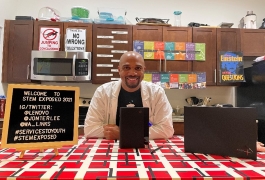Developing Interpersonal Skills in College
In elementary, middle, or high school, you undoubtedly heard your teacher say, "You are going to be working in a group for this activity," and probably had one of two reactions: (1) you welcomed the idea of being able to get together with your friends and peers for activities, or (2) you dreaded getting stuck with peers who didn’t pull their weight.
Whether you loved or dreaded group activities depended largely on the interpersonal skills of both you and your teammates. Chances are no one ever taught you how to be a good team player. You and your classmates either figured out how to collaborate and work effectively together, or you didn’t.
According to Indeed.com, employers want to hire people with strong interpersonal skills because they have a higher probability of working well with others and collaborating effectively. In addition, those who communicate better and motivate others tend to be good leaders.
So, how do you know if you have good interpersonal skills? And how do you prove to a potential employer that years of group work were not wasted? Read on to find out.
The importance of interpersonal skills
In a study published in Nature magazine, researchers concluded that the role of interpersonal skills is critical to solving systemic problems of our world. According to the report, “the literature suggests that to successfully frame a scientific problem, a team must also engage emotionally and interact effectively, and that scientific collaboration involve consideration of the process, collaborator, human capital, and other factors that define an scientific collaboration.”
Whether you become a scientist working in research, business, non-profit, or teams in other sectors, you will have daily interactions work with others and collaborate on countless projects. How you approach those projects and interactions socially will influence the potential strides you can make, the productivty of your workplace, and the harmony of your relationships.
“The best combination for someone with a career in STEM is a strong technical background with a solid mix of interpersonal skills,” says Lucinda Jackson, the founder of LJ Ventures and an ACS Career Consultant. “Often technical people are more interested in science, but relationship-building, communication, and teamwork are essential for career success.”
Jackson considers communication and flexibility to be top interpersonal skills. “We must be able to work easily with others, especially with nonscientists, understand the goals of our organization, and collaborate with teammates to meet those goals,” says Jackson. Not communicating leads to misunderstandings, duplication, and loss of value to the organization.
On the flip side, dominating the conversation can make you self-centered or even arrogant, especially if you use too much specialized jargon or spend too much time explaining science your teammates don't need to hear. There needs to be a balance between the two, says Jackson.
Marciano Bagnoli, also an ACS Career Consultant and a quality manager at Bakelite Synthetics, agrees that clear communication is an essential interpersonal skill when it comes to creating actionable solutions. Too much communication, however, can be a problem. “People often will overexplain a problem to show their knowledge or familiarity, but this does not move the needle.”
Instead, propose solutions. “Showing knowledge through a clear, actionable solution is more effective,” he adds.
As a science major, you are already familiar with critical thinking and having discipline, which you need to analyze results, solve problems, hit deadlines, and meet goals. However, you may not have thought of flexibility, which Jackson defines as having a growth mindset. “This may involve taking on tasks/assignments that are not related to your field or [that are] outside of your comfort zone,” she says.
So, flexibility doesn’t just mean staying late for a reaction that is taking longer than you planned. It also means being cognizant of the needs of the whole team and being willing to shift to a new project, learn a new skill, or take on a new role as the situation demands. Because technology and business demands constantly change, employers like to know that you can adjust with changing circumstances.
Building skills before you graduate
You may be thrown into group work in school, but you also have ample opportunity to develop interpersonal skills consciously. Start by reading books and articles on team dynamics, roles people serve in a team, and how to be a good team player. Learn about different personalities so you can have empathy for others and manage conflicts.
Jackson suggests putting your learning into practice by getting involved in group activities. “You can develop interpersonal skills through sports, membership societies, professional organizations like ACS, and by attending conferences or meetings of local chapters,” says Jackson.
Joining—or even taking a leadership role—in an ACS student chapter or other volunteer organization will provide opportunities for you to practice active listening or showing empathy to group members who open up to you about their feelings about a project.
You can also practice communication skills by talking about your major, classes, and studies with friends and family who are not familiar with your field to learn how to adapt to different levels of understanding. Bagnoli suggests practicing telling what it is you do so that the person genuinely understands. Avoid technical terms, as well as over-explaining background or going on irrelevant tangets.. Instead, he says, think of how to communicate exactly what the audience needs to know so you allow the individual to go on a journey with you to examine and solve the problem.
Another interpersonal skill Bagnoli suggests practicing is questioning your assumptions before addressing a problem, rather than just reacting. “In a lab environment, we wouldn’t simply mix random chemicals,” he says. “Instead tests are done, then we act on the data that is produced. Yet, when it comes to working with others, it can be tempting to assume what others know, value, or feel.” Instead, find out what that person knows, values, and feels to better understand their point of view.
Practicing active listening skills before making a recommendation or sharing information is another way to develop interpersonal skills. “[You] try to genuinely get to know someone by learning about their problems or concerns, then understand how our data or contribution fits into the lives of others,” says Bagnoli.
Showcasing your interpersonal skills
You can showcase on your résumé your interpersonal skills by adding relevant volunteering experiences and during interviews, you can highlight specific examples of how you demonstrated interpersonal skills in previous roles you have undertaken. Additionally, you can provide references who can speak to your abilities in this area.
But rather than simply noting you were a member of your school’s ACS student chapter, Bagnoli advises using the STAR framework to describe your experience:
- Situation: Describe a specific situation, activity, or problem. (“Classroom visit with fourth-graders to talk about polymers.”)
- Task: Describe your goal; you may combine the descriptions of the situation and task, if appropriate. (“Develop and execute engaging classroom activities to teach four-graders about polymers.”)
- Action: Detail your role in the task. (“I collaborated with other club members and the students’ teachers to develop three age-appropriate activities and explanations. I scheduled practices, coordinated acquisition and delivery of supplies, ensured chapter member participation, developed presentation scripts, and helped present the activity.”)
- Result: Specify the outcomes of the activity. (“Over 120 students learned about polymers, with teachers reporting 80% retention of the information after 1 month.”)
The idea is to “present a problem you encountered and how you brought about change through developing a story or journey of discovery, the impact of the results, and how they were communicated to the team.”
When you are composing your résumé, do not simply write “skills,” says Bagnoli. “If I were to compare three résumés side by side, and each said “communication skills” on them, how would I know which person is a better communicator?” Instead, highlight specific skills or, better, instances in which you successfully used those skills.
During interviews, employers often ask behavioral questions to ascertain how you, the potential employee, will react and adapt to specific situations. Your responses to the questions illustrate your interpersonal skills as you convey your ability to successfully resolve conflicts, lead or participate in a team to accomplish a goal, or give examples of how you solved problems.
Bagnoli advises using the STAR model to frame your experience contextually, which will “not only showcase your knowledge of the role you had but also your knowledge of how that role affected others.”
Jackson adds that you can put your interpersonal skills on display by making the interview a conversation/dialogue rather than a monologue, asking questions, being friendly and honest, and sharing your experiences of how you get along with people in your personal and professional life. “We may not like everyone we deal with, but we can show how we found a way to work with them,” she says. “One way I do this is to identify something in everyone that I admire and use that as the focal point when collaborating,” she adds.
Last thoughts
By now, you may be thinking that your elementary/high school teacher was on to something with all those group assignments. In those days, you may not have had guidance on how to use those group experiences well, but interpersonal skills can be developed by anyone, regardless of their background or experience level.
Developing strong interpersonal skills before you graduate is essential not only for success in a school or work environment but also in social situations. By being self-aware and practicing these skills in various situations, you can build strong relationships, work collaboratively toward common goals, and communicate and interact effectively and efficiently with others.




